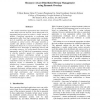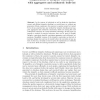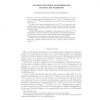2124 search results - page 31 / 425 » Aggregating time partitions |
SIGMOD
1997
ACM
13 years 11 months ago
1997
ACM
Aggregation in traditional database systems is performed in batch mode: a query is submitted, the system processes a large volume of data over a long period of time, and, eventual...
ICDCS
2005
IEEE
14 years 1 months ago
2005
IEEE
We consider distributed applications that continuously stream data across the network, where data needs to be aggregated and processed to produce a 'useful' stream of up...
MLDM
2005
Springer
14 years 1 months ago
2005
Springer
In the context of large databases, data preparation takes a greater importance : instances and explanatory attributes have to be carefully selected. In supervised learning, instanc...
FQAS
2004
Springer
13 years 11 months ago
2004
Springer
In the context of relational as well as deductive databases, correct and efficient integrity checking is a crucial issue, as, without any guarantee of data consistency, the answers...
FOCS
2006
IEEE
14 years 1 months ago
2006
IEEE
Given an n-element set U and a family of subsets S ⊆ 2U we show how to count the number of k-partitions S1 ∪ · · · ∪ Sk = U into subsets Si ∈ S in time 2nnO(1). The only...



